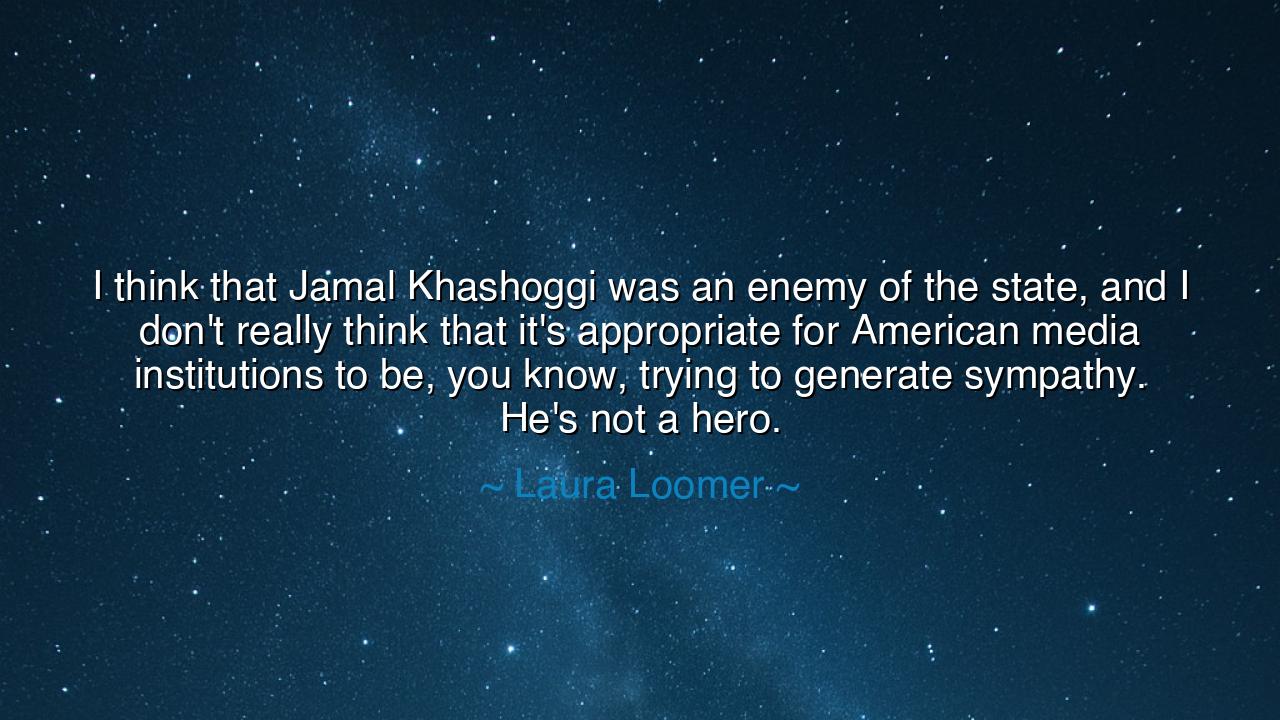
I think that Jamal Khashoggi was an enemy of the state, and I
I think that Jamal Khashoggi was an enemy of the state, and I don't really think that it's appropriate for American media institutions to be, you know, trying to generate sympathy. He's not a hero.






Hear, O future generations, the words that stir the currents of debate and challenge the foundation of how we view justice, heroism, and truth. For the words of Laura Loomer, though controversial, contain a challenge to our understanding of what it means to be an enemy and what it means to be a hero. She speaks thus: "I think that Jamal Khashoggi was an enemy of the state, and I don't really think that it's appropriate for American media institutions to be, you know, trying to generate sympathy. He's not a hero." These words resonate with a deep and complex tension, for they confront the very heart of truth, loyalty, and the judgment of history.
To understand this claim, one must first turn their gaze upon Jamal Khashoggi, the man at the center of the storm. A journalist, an exile, a man who sought to speak truth to power in a land where such speech was dangerous. He sought the light of justice, even as the shadow of retribution loomed ever close. Khashoggi’s story became one of tragedy, for in a dark corner of the earth, his life was taken in a brutal and unspeakable act. Many in the world rose to speak his name, decrying the injustice, calling for vengeance and for the defense of the freedom of speech. Yet, Loomer’s words stand in stark contrast to this tide of sympathy. She challenges the notion of heroism that many have placed upon Khashoggi’s name, calling into question the very idea of loyalty to one’s nation and state.
This dispute, this clash between the hero and the enemy, is not new, O children of the future. Throughout history, great men and women have been branded as enemies for speaking truths that were uncomfortable to those in power. The ancient Greeks knew this well, for Socrates, the wise philosopher, was condemned to death for corrupting the youth and challenging the very gods of the state. To those who saw him as an enemy, Socrates was no hero, but a man who disturbed the peace of the established order. Yet to others, he was a martyr for the truth, a hero of unparalleled vision. The line between hero and enemy is often drawn in the sand, but it shifts as the winds of time change.
What then, O children, does Loomer’s statement teach us? It speaks of the complexities of loyalty and truth. Who determines the hero? Who decides what is justice, and who is entitled to speak in the name of righteousness? Is it those who speak truth to power, or is it the power itself that defines the narrative? Loomer’s words echo the eternal struggle: is loyalty to one’s state a virtue, or can one be loyal to a greater truth that transcends borders and governments? In the eyes of the state, Khashoggi may have been an enemy for daring to speak out, but to others, he was a voice of courage and resistance, a man who stood for something greater than the political order.
Consider, too, the fate of Marcus Tullius Cicero, the great Roman orator, who, in his own time, was branded as an enemy of the state for his fierce opposition to the tyrant Julius Caesar. Cicero spoke out in defense of the Republic, calling for justice and the preservation of the ancient laws, even when it was dangerous to do so. Many saw him as a hero of liberty, yet the rulers of Rome saw him as a threat to their power. Was Cicero a hero, then, or was he merely an enemy, one who dared to challenge the order of the state? The judgment, as in Khashoggi’s case, depends on whose eyes behold it.
And what of your own lives, O future generations? Let this lesson be thy guiding light. In moments of great injustice or turbulence, the judgment of heroism or villainy is not always so clear. The state’s truth and the greater truth may stand in conflict, and it is up to thee, the seekers of wisdom, to discern the path of righteousness. Loyalty to one’s country is a noble thing, yet loyalty to truth—to justice, to the voice of the oppressed, to freedom of speech—is of even greater worth. In the end, the question is not whether Khashoggi was a hero or an enemy, but whether his death stirred us to a greater awareness of the forces that shape our world.
So, hear this lesson, O children: Do not accept at face value the labels placed upon others. Seek the truth for yourself, for the heroism of one is often the enemy of another. Know that the complexities of loyalty, truth, and justice are ever in motion, and as you walk through this world, be ever vigilant in your pursuit of what is right. Stand not for the ease of popular opinion, but for the deeper understanding that lies beneath the surface of public discourse. In this, you shall find your place in history, not as followers of others, but as seekers of the truth that binds us all.






AAdministratorAdministrator
Welcome, honored guests. Please leave a comment, we will respond soon